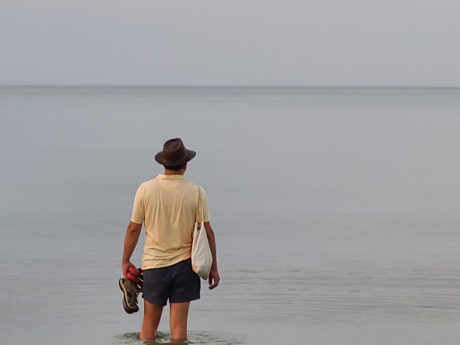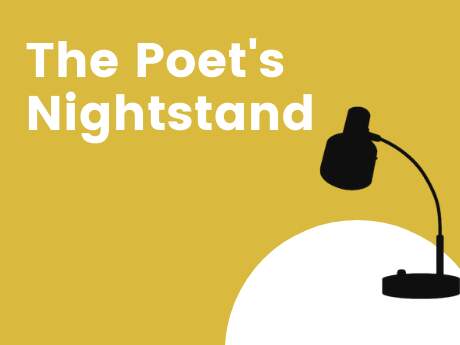The Poet’s Nightstand
The Poet’s Nightstand with Jesse Nathan
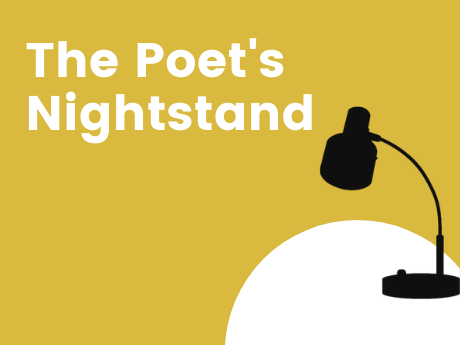
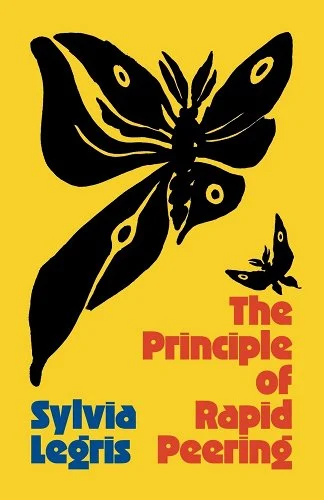
The Principle of Rapid Peering
Sylvia Legris
I love reading these poems out loud. This latest collection from the Saskatoon poet Sylvia Legris meets a prairie almanac with the sonic intensity—and density—of Hopkins or Plath. The result is delicious. “Plants and potent juice,” begins “Viscum Album.” The texture is thick, and the method is botany. “Mist and droppings. // Birdlime. Missel thrush.” As with the actual prairie ecosystem—once earth’s largest kind of ecosystem, now this planet’s most desecrated, most savagely ruined by centuries of extraction agriculture—these poems are an invitation to get up close, so as to actually see the “ground truth” and the “purple prairie clover” and the “nodding beggarticks, / alighting cabbage whites.” The book is a walk through spring grasses, but it’s also getting down on your hands and knees to put your nose in it. A collection that has me wanting to walk around barefoot in the summer with a fishing pole and a blanket and a bottle of wine. It’s drunk on language, but it’s made of the elegiac longing of any life. Here, where poetry fulfills a “melodic expectation.” Where poetry is relieved of opinions and rants, and description becomes revelation.
Purchase
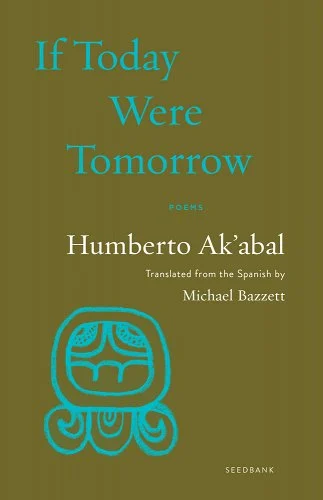
If Today Were Tomorrow
Humberto Ak’abal
Translated from the Spanish by Michael Bazzett
When I lived in Guatemala, the natural beauty of the land—from black sand beaches to mountain rainforests—felt as profound as the palpable history of political violence that has wracked it for centuries. It’s a country the size of Ohio, in which twenty-five distinct languages are spoken. Out of one of these, K’iche’, emerges the work of the poet Humberto Ak’abal, who died in 2019. This is the culture and language—“my language was born among trees”—that produced the Popol Vuh, that Epic of Gilgamesh or Beowulf of the Americas. Ak’abal, drawing on the animated symbolism of his tradition, mixes a rawness with a passionate precision. The poems have occasion beyond observation. “Trees,” one poem begins, “burn with green / foliage” and as rain falls on “the strange fire,” “the greener it burns … // How I’d love to wallow in those leaves!” This is a book of strange fires and leaf-wallowing, of stone and namelessness and bats of ash. Ak’abal’s translations of his work into Spanish are on one side, and Michael Bazzett’s English is on the other. Ak’abal is a rural poet, a reluctant city-dweller: “The bustling city took no notice / of my arrival.” But he speaks, in part, for a tradition that survives: “The flame of our blood keeps / burning / despite centuries of wind.” Though he died in 2019, Bazzett reminds me how alive he is.
Purchase
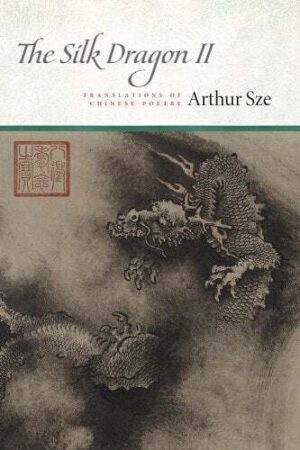
The Silk Dragon II
Translations of Chinese Poetry by Arthur Sze
Anthologies are so tantalizing, and yet so rarely pay off. But there have been two recent gatherings of Chinese poetry as essential to me as they are gorgeous. One is Wong May’s In the Same Light: 200 Poems for Our Century from the Migrants & Exiles of the Tang Dynasty. More recently I’ve been reading Arthur Sze’s The Silk Dragon II, which expands, with eighteen new translations, the original Silk Dragon, his book of English versions of Chinese poetry, published twenty-three years ago. The anthology now moves from Tao Yuanming into the present rather than breaking off, as the first version did, in the middle of the twentieth century. This new rendering of the anthology not only goes from the classical Chinese of Li Bai, across the great vernacular shift in early twentieth-century Chinese letters, but also from that rupture onward to its eventual fruits in the present. The work, for instance, of poets like Zhai Yongming, Xi Chuan, and Wang Jiaxin. Sze, in his clearwater and efficient translations, in his supple introductions and notes, is a brilliant guide to one of the world’s greatest poetry traditions. A tradition of clarity and nuance and moonlight. And what’s special about the updated version of this book is that it leans further into continuities where many translators and scholars highlight the chasm between ancient and new. “I pull out the Chinese drawers, one by one,” writes Yan Li in Sze’s version, “take a look at the years that I lived through.” The line gives me shivers. Or Wang Jiaxin, born three years after Yan Li, in 1957, and who just recently read in my neck of California: “Great literature can only come from purgatory.” The poem—and the anthology—reminds me that purgatory is a kind of antechamber, and our century, maybe, is an antechamber between the specificity and brutality of the past, and whatever we’ll make of it.
Purchase

Daywork
Jessica Fisher
It’s been almost fifteen years since Jessica Fisher published a book of poems. I trust that kind of slow work, that quiet refusal to perish or publish. Daywork is the beautiful yield of those years, and worth the wait. It’s a book about being a mother—and so also a book about the childhood of that mother—but it’s also a book that travels to Rome as it navigates—and that’s the word, for time is a sea here—life in a teetering modern empire, our lives at every turn entangled in a vast reckless collective. Violence is always, to this poet, as important to look at as it is coldly awful: “Must this,” she writes without a question mark, “once again be my subject.” It must be. In another poem set in a museum, “The baby on my hip is tired,” she writes, the speaker unable to shake the thought of an anonymous painter centuries ago “painting with a single gesture / murderer and the bereaved mother / bent over the place her son must have lain … ” It’s hard to capture in the short space I have here the way this book teems with style and theme and a kind of mysterious but always palpable urgency, an urgency as quotidian as it is erotic—like this command: “Bridegroom, here is my body. Through my hair, your fingers”—poetry as bracingly lyric as it is refreshing. “Salt on the skin from within / Or close now to the ocean.” This is the voice of poetry: the voice of a beloved speaking beside you, “though you were asleep, and did not hear.”
Purchase
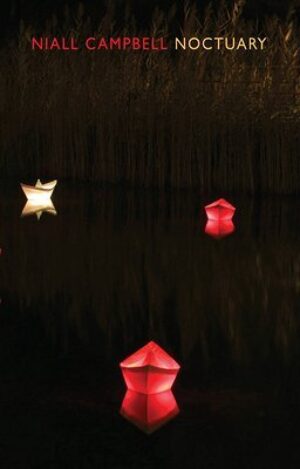
Noctuary
Niall Campbell
My own time right now is a time of babies. For most of my adult life, I didn’t think much about having children. But they’ve changed the way I see, and they’ve helped me see anew the burning world. And I know they’ll shape my writing the way everything at the core of my life shapes my writing—for how could it not? But I often feel confused about how to find my way to representing what I’m experiencing—how to find the pitch, the image, and the relation to privacy and complication. Like Fisher, the Scottish poet Niall Campbell shows the way. Campbell’s Noctuary wakes up in the small hours to sing the baby back to sleep. And in that sleepless blear finds surprising, aching, sturdy forms for the wonder and the wondering, for the way a life must change with fatherhood, and may find it always wanted to: it was “the quiet—because I owned it, / once – but found I wanted more.” That’s not to say the book isn’t wide-ranging and split by all kinds of desire. “Living in the City and Dreaming of the Winter Beach” is the name of one poem. “I wanted this—to be so far off, / to leave my wake in the sand’s drift,” it begins, ending eventually like so: “I wanted this—to stand apart, / to stand close, and be generous.” A noctuary is a record of the night’s activity. Small airfields used to keep them, tracking what flew in and out, and what passed by. To me, the night is vaguely terrifying. But it turns out it’s just another place we live. “Good night,” writes Campbell, “here’s love like a faint snowfall.”
Purchase

